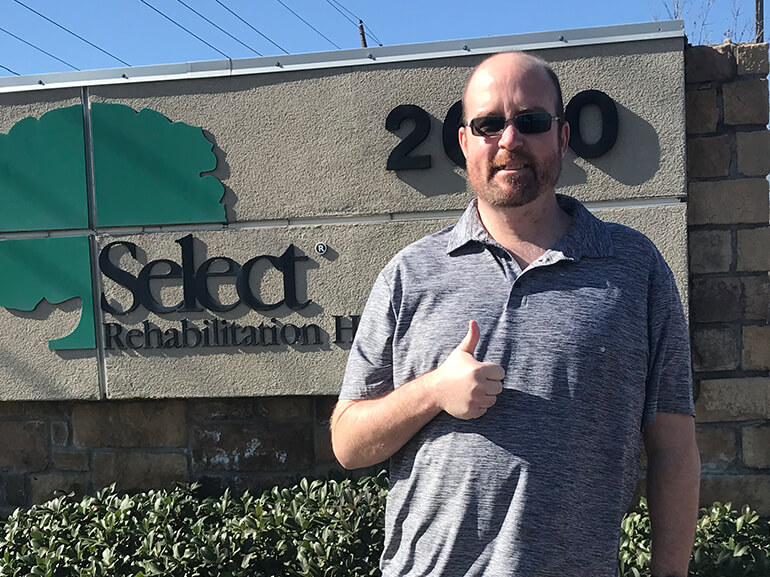Jason's Story

Jason Harrison, a 40-year-old IT consultant and family man, enjoys spending time with his wife, Schelley and three daughters, Emily, Harli and Karissa. In November, Jason’s life took a sharp turn. He went to an urgent care center after experiencing a low-grade temperature. The following day, he found out he was positive for COVID-19. Following his diagnosis, he began feeling sluggish and tired. He and Schelley decided he should go to the local hospital, where he was given fluids and sent home.
Over the next few days, Jason began feeling worse and was taken to the hospital where he was assessed, given oxygen and sent home again. When he began experiencing rapid breathing, Schelley called an ambulance. He was taken to a hospital in Gainesville, Texas where he stayed for two days. “From what I understand, I went into septic shock and they intubated me,” said Jason. At that point, he was airlifted to Baylor Scott & White Medical Center – Centennial, where he was in the ICU for nine days and diagnosed with influenza B, COVID-19, pneumonia and diabetic ketoacidosis, a life-threatening condition that develops when the body can't produce enough insulin. Once stabilized, Jason transferred to Select Rehabilitation Hospital of Denton to continue his recovery.
Upon arriving, Jason had difficulty swallowing, his cognition was impaired and he was unable to get out of bed or walk. “I was 100% reliant on others to help me and even had to have help using the bathroom,” said Jason. A few days after beginning therapy everything “started clicking” according to Jason. “I was able to swallow a little better and walk a bit more.”
During speech language therapy, Jason focused on his cognition and swallowing. He participated in activities for cognitive retraining, swallow strengthening exercises and neuromuscular electrical stimulation, a method for stimulating muscles with short electrical pulses. Once he began strengthening those muscles, Jason completed two swallow study tests to assure it was safe for him to begin a regular diet with thin liquids. “I haven’t wanted a pureed pancake in some time,” he joked.
Physical therapy addressed Jason’s weakness, limited range of motion and poor coordination. His physical therapist used dumbbells, sit-to-stand exercises and sidesteps along the wall to help him learn to walk again. “My homework was to try to engage my thighs when sitting still.” Jason fondly remembers being in a standing frame, an assistive device that enables individuals with restricted mobility the opportunity to spend time in a supported standing position, for the first time, “I wasn’t able to stand up at all until they did that. It felt awesome. My legs felt stretched out.”
His occupational therapists helped him with moving around the room, getting dressed and showering. Tools like therapy resistance bands were used often for exercises. “What really helped a lot was the hot compresses on my shoulder for pain,” said Jason. After a lot of hard work, his range of motion improved and he was excited to be able to scratch his head again. “I wanted to get better and everyone helped me.” Jason also worked with doctors to learn how to control his blood sugar.
After two weeks, Jason discharged home with his wife and daughters and began outpatient therapy at Select Rehabilitation Hospital of Denton. His left foot continued to improve and swelling decreased with no discoloration. In time, Jason began driving again, even taking his daughter to a fair, where he walked more than two miles. He also started to work again full-time and remotely as an IT consultant.
Jason recently shared, “I’m getting a little more acclimated to the world. In the hospital you get a little numb.” But he fondly recalled his doctors taking him outside for the first time saying, “That breathe of fresh air and sun felt great. Those little things added up to a really good recovery experience.”